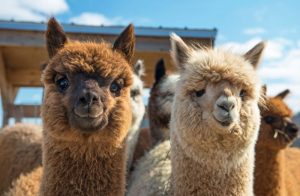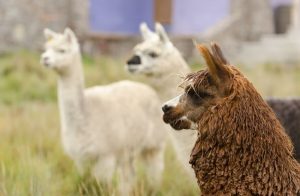
What You Need to Know About Alpacas Spitting
As alpacas become more and more popular as small livestock animals, farmers, hobbyists, and homesteaders may wonder how similar these camelids are to their cousins, the llamas. Llamas have a reputation for being stoic and often covering their agitators with a wad of spit. If you plan on getting alpacas, you should know your chances of getting spit on.
So, do alpacas spit? Alpacas do, in fact, spit like their llama cousins. They may use spitting to warn that they are getting agitated or to deter predators or other animals from getting closer. Alpacas will regurgitate and spit the contents of their stomach up to 10 feet away.
While spitting is disgusting, it’s also an important part of how alpacas communicate. Since animals can’t talk, they use other ways to let you know what they are feeling. If you plan on having any livestock or pets, you should take the time to learn the animals’ behavior so you can stay safe and understand what the animal is trying to tell you. To learn more, keep reading!
Why Do Alpacas Spit? Essential Alpaca Behavior
Spitting is a defensive behavior carried out by an alpaca in numerous situations. Most alpacas spit for the same reasons that llamas do. Here are some things to consider about a spitting alpaca:
Alpacas Spit to When Agitated
The great thing about alpacas is that they’ll let you know when they’re starting to get agitated about something. There are many things that may cause your alpaca to get annoyed, from being crowded at feeding time to being barked at by a dog. The great thing is that alpacas will give you a few good warnings before taking matters into their own hands…or hooves. These warnings usually come as a mist of spit.
Instead of huffing out a wad of spit, an agitated alpaca will more likely spray spit out of its mouth, creating a light mist. This can signal to another alpaca that they’re getting too close at feeding time. if the problem progresses. then the alpaca will give a more clear warning by spitting out a large wad.
Another way an alpaca may express that they are uncomfortable or annoyed is by humming. I’ve seen alpacas do this when there is something they are unsure of, like a new object in the pasture or commotion going on in the distance. The hum almost sounds as if the alpaca is humming. While most alpacas won’t spit at humans, they may try to communicate annoyance or agitation with you by humming.
While other animals can cause alpacas to be annoyed and cause them to spit, alpacas will mostly spit at other alpacas. Living in a herd is like living in a family, and you’re bound to get annoyed with someone at one point or another. Alpaca breeders can even use spitting behavior to determine whether their alpacas are pregnant or not. It’s said that pregnant alpacas will spit at male alpacas to keep them away.
Alpacas Spit to Ward of Predators
Like their larger cousins the llamas, alpacas have a fighting streak in them. Llamas are often used as livestock guardian animals since they are willing to show aggression towards predators. While alpacas may not be suited as guardian animals due to their small size, they can still show the same aggression that llamas do.
Alpacas will stand their ground against predators; in fact, they’ll use their spitting as a weapon. Alpacas will shoot wads of spit out of their mouth at the predator to deter the predator from coming any closer. Alpacas may also charge, kick, and bite to fend off any animal they see as a threat.
The most common predators to alpacas include dogs, coyotes, bobcats, mountain lions, and bears. While an alpaca may be more willing to stand and fight, due to their small size they usually don’t have a chance against a hungry wild animal. For this reason, it’s important to provide a livestock guardian animal to protect your alpacas. dogs, donkeys, and even llamas are a great choice of guardian animal for your alpacas.
To learn more about livestock guardian animals, check out my article What Are the Best Livestock Guardian Animals?
When facing a predator, an alpaca will screech or scream, which acts as another way to deter the predator from attacking. The good news is that even in your house, you can usually hear the screaming of an alpaca, giving you time to rush out and see to your animals’ aide.
Alpacas Spit to Show Dominance
 An alpaca is a herd animal, which means that living in a herd is their natural instinct. Most prey animals live in herds to provide them with security and protection from predators. Since alpacas are naturally social creatures, there comes a social hierarchy within the herd.
An alpaca is a herd animal, which means that living in a herd is their natural instinct. Most prey animals live in herds to provide them with security and protection from predators. Since alpacas are naturally social creatures, there comes a social hierarchy within the herd.
If you take time to watch alpacas in their pasture, you may notice that there is one alpaca that seems to be the boss of all the others. This is the established alpha alpaca, the one that has managed to prove that is not to be messed with. This alpaca is probably the first to eat at feeding time but also the one to stand up and protect the others in the herd.
One way alpacas try and establish dominance over each other is by spitting. The alpacas higher up in the pecking order will spit wads at the younger and weaker alpacas to remind them of their place. While most alpacas won’t spit at humans, if you have an alpaca that spits at you, they may try to be exerting their dominance over you.
How to Avoid Getting Spit on By An Alpaca
Many people prefer alpacas to llamas since alpacas are known to be nicer and friendlier than their large cousins. Very rarely do alpacas spit at humans, but when they do, it can be messy. To huff an aggressive spit, alpacas will regurgitate and use the contents of their stomach to create a sticky, stinky bullet of spit. You can avoid getting spit on by understanding why alpacas may spit at humans and how you can avoid it. Here are some reasons an alpaca may spit at a human:
- the alpaca has been abused in the past by humans
- the alpaca was not raised with other alpacas
- you have an alpaca that is particularly dominant.
- your alpaca is genuinely afraid of something
Understanding why your alpaca is spitting at you can help you work to correct the problem. If you have an alpaca that is untrusting and has gone through trauma, being patient and taking the time to show the alpaca that you aren’t a threat can drastically alter their behavior. This can also help your alpaca to be more trusting in situations of uncertainty when they feel afraid.
If you have an alpaca that is trying to be dominant with you, it’s important to be assertive, yet friendly and kind. One of the reasons an alpaca may try to show its dominance towards humans is if it was taken from its herd at a young age or not raised with other alpacas. This means they are more used to humans being their herd than other alpacas. Bad behavior and spitting should be addressed and corrected in these alpacas. I’ve heard of people using squirt bottles to squirt the alpaca when it started to show signs that it was going to spit. Even just using your voice to give a firm correction can be enough to deter bad behavior.
Luckily, rarely do alpacas spit without warning. Alpacas will communicate via body language and humming that they may be getting ready to spit. Before an alpaca spits, they’ll first tilt their head up and lay their ears flat against their head. The alpaca will make a gurgling sound before spitting, so when you hear that, you should prepare to get spit on. An alpaca will also hum to let you know that they feel uncomfortable, annoyed, or unsafe.
In Conclusion
Alpacas are popular small livestock that are known for their peculiar behavior of spitting. While this behavior can be off-putting, alpacas rarely spit at humans and are often enjoyed by many by their friendly personalities and their small size. I highly recommend adding alpacas to your farm or homestead!
We have many articles aimed at answering your questions about raising poultry and livestock. Looking for something to read next? Check out the articles below!
- Can Goats Live in the Woods?
- Can You Keep a Sheep By Itself? Essential Guide
- Do Goats Protect Chickens? What You Need to Know
P.S. Save this to your “Alpacas” board!
